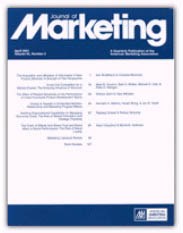
Stremersch, S., Winer, R. and \Almeida Camacho\, N. (2021). Faculty Research Incentives and Business School Health: A New Perspective from and for Marketing Journal of Marketing, :.
-
Affiliated authors
-
Publication year2021
-
JournalJournal of Marketing
Grounded in sociological agency theory, the authors study the role of the faculty research incentive system in the academic research conducted at business schools and business school health. The authors surveyed 234 marketing professors and completed 22 interviews with 14 (associate) deans and 8 external institution stakeholders. They find that research quantity contributes to the research health of the school, but not to other aspects of business school health. The r-quality of research (i.e., rigor) contributes more strongly to the research health of the school than research quantity. The q-quality (i.e., practical importance) of research does not contribute to the research health of the school but does contribute positively to teaching health and several other dimensions of business school health. The authors conclude that faculty research incentives are misaligned: (1) when monitoring research faculty, the number of publications receives too much weight, while creativity, literacy, relevance, and awards receive too little weight; and (2) faculty feel that they are insufficiently compensated for their research, while (associate) deans feel they are compensated too much for their research. These incentive misalignments are largest in schools that perform the worst on research (r- and q-) quality. The authors explore how business schools and faculty can remedy these misalignments.